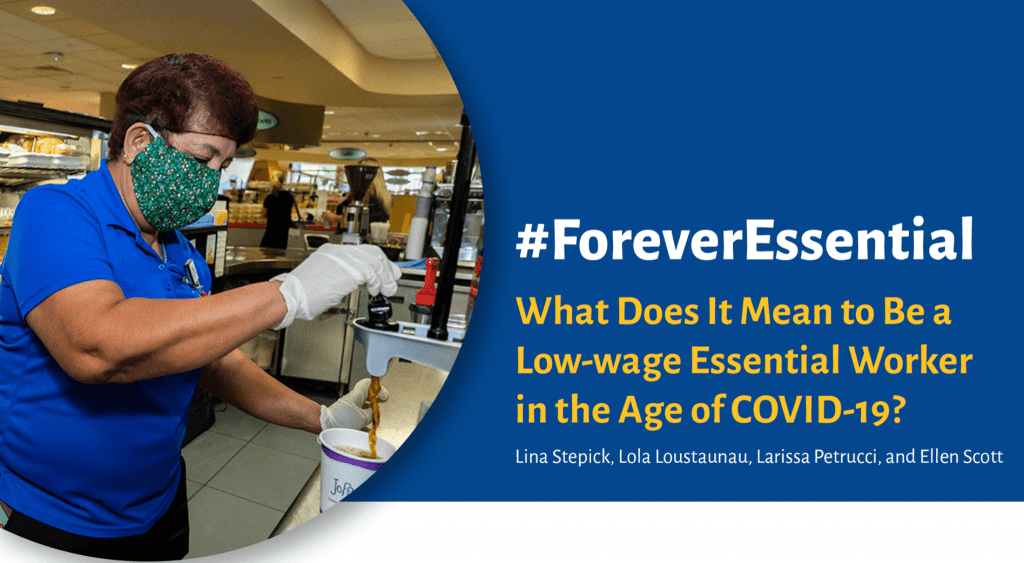Research & Publications
Our research is conducted on issues related to employment, labor relations, economic affairs, race and gender in the workplace, and workers’ legal rights. Our studies and reports have been used by academics, unions, government agencies, community organizations, and elected officials in developing policies and programs that address the needs of working Oregonians.
As the following studies and reports indicate, LERC faculty members possess wide-ranging scholarly and research expertise. We are committed to making this expertise readily available to the University community and the broader Oregon community, as an essential element of our public service.

Oregon's Farmworker Overtime Law and its Legislative Future
Mary Follo, MPP, MS. – A Graduate Researcher at the Labor Education and Research Center. November 2024

Industry Analysis: Wage and Employment Trends for Oregon Iron Workers
LERC Co-director Gordon Lafer, PhD, and Kisa Clark, MA PhD Candidate and Graduate Researcher at LERC. April 2024

Schoolboard Communications with Educator Unions: What's Legal and Illegal in Oregon?
LERC Co-director Gordon Lafer, PhD. April 2024

A Labor Crises within the Child Care Crises: Growing need for "Non-traditional hours" Met by Underpaid In-Home Providers
Larissa Petrucci, Lola Loustaunau, Mary C. King, Lisa Dodson, Ellen Scott. July 2022 (For executive summary click here)

Building Back Better or Building Back Worse: The challenge of building a high-road EV industry with anti-union employers
Gordon Lafer, PhD, and LERC Co-Director. November 2021 (For executive summary click here)

Constructing a Diverse Workforce: Examining Union and Non-Union Construction Apprenticeship Programs and their Outcomes for Women and Workers of Color
Larissa Petrucci, PhD. November 2022 (For executive summary click here)

A State of Immigrants: A New Look at the Immigrant Experience in Oregon
Professor Robert Bussel, Editor
Director, Labor Education and Research Center. October 2021 (Para espanol, haga clic aqui)

Essential Work, Disposable Workers: Experiences of Immigrant and Refugee Food Processing Workers During the COVID-19 Pandemic in Rural Washington
Lola Loustaunau, Sociology Doctoral Candidate. April 2021
BOOKS BY LERC FACULTY
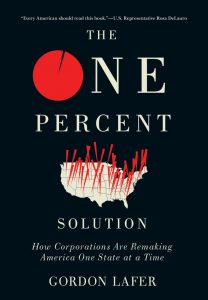 Gordon Lafer, The One Percent Solution: How Corporations Are Remaking America, One State at a Time
Gordon Lafer, The One Percent Solution: How Corporations Are Remaking America, One State at a Time
Cornell University Press, April 2017
In the aftermath of the 2010 Citizens United decision, it’s become commonplace to note the growing political dominance of a small segment of the economic elite. But what exactly are those members of the elite doing with their newfound influence? The One Percent Solution provides an answer to this question for the first time. Gordon Lafer’s book is a comprehensive account of legislation promoted by the nation’s biggest corporate lobbies across all fifty state legislatures and encompassing a wide range of labor and economic policies.
 Bob Bussel, Fighting for Total Person Unionism: Harold Gibbons, Ernest Calloway, and Working-Class Citizenship, University of Illinois Press, October 2015
Bob Bussel, Fighting for Total Person Unionism: Harold Gibbons, Ernest Calloway, and Working-Class Citizenship, University of Illinois Press, October 2015
During the 1950s and 1960s, labor leaders Harold Gibbons and Ernest Calloway championed a new kind of labor movement that regarded workers as “total persons” interested in both workplace affairs and the exercise of effective citizenship in their communities.
Working through Teamsters Local 688 and viewing the city of St. Louis as their laboratory, this remarkable interracial duo forged a dynamic political alliance that placed their “citizen members” on the front lines of epic battles for urban revitalization, improved public services, and the advancement of racial and economic justice. Their pioneering efforts raised fundamental questions about the fate of the post-industrial city, the meaning of citizenship, and the role of unions in shaping American democracy.
EDUCATION POLICY
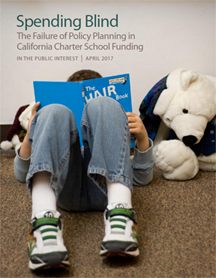 Spending Blind, by Gordon Lafer, was published in April, 2017 by The Public Interest. The study, the first of its kind in the country, examines how hundreds of millions of dollars are spent every year on renting, leasing or building buildings for California charter schools, but it all takes place without any effective policy guidance. Desperately needed education dollars are being wasted by paying to open schools that in many cases are both not needed for the population of students and do not provide an education that is better than what is already available in nearby public schools.
Spending Blind, by Gordon Lafer, was published in April, 2017 by The Public Interest. The study, the first of its kind in the country, examines how hundreds of millions of dollars are spent every year on renting, leasing or building buildings for California charter schools, but it all takes place without any effective policy guidance. Desperately needed education dollars are being wasted by paying to open schools that in many cases are both not needed for the population of students and do not provide an education that is better than what is already available in nearby public schools.
ALL COSTS CONSIDERED III — LERC Report on Contracting Out
Gordon Lafer and Bob Bussel, with assistance from graduate student Jaxon Love have completed a third study on the contracting out of school support services in Oregon, 2013
IMMIGRATION
Over the last two decades, the face of Oregon has changed dramatically with the arrival of significant numbers of immigrants and refugees. In spite of the profound demographic and social changes that Oregon is undergoing as its population has grown more diverse, there has been little systematic analysis of how immigrants are faring in their attempt to establish themselves in their new environment.
We offer this report as an initial effort to help broaden public understanding of the immigrant experience in Oregon and contribute to a more informed discussion of its complexities. It is time for policymakers, employers, educators, and civic leaders to recognize Oregon’s changing social demographics and develop a more systematic approach to helping immigrants adapt to their new environment.
 Policy Options for Attaching Labor Standards to Employment in the Clean Energy Technology Sector LERC’s Department Manager, Deb Mailander, worked with University of Oregon Law School students in Fall 2019 to research opportunities where high quality jobs and labor standards could be incorporated into federally funded renewable energy technology projects. The resulting report was published by the Law School’s Environmental and Natural Resources Law Center. (Fall, 2019)
Policy Options for Attaching Labor Standards to Employment in the Clean Energy Technology Sector LERC’s Department Manager, Deb Mailander, worked with University of Oregon Law School students in Fall 2019 to research opportunities where high quality jobs and labor standards could be incorporated into federally funded renewable energy technology projects. The resulting report was published by the Law School’s Environmental and Natural Resources Law Center. (Fall, 2019)
JUST AND FAIR ECONOMY
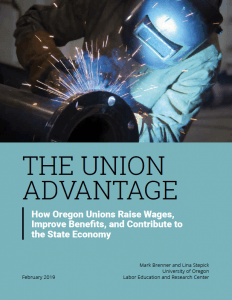
In February 2019, “The Union Advantage” was co-authored by LERC faculty members Mark Brenner and Lina Stepick.
The study provides the first empirical assessment of the impact of unions on living standards for Oregon workers. Their findings are consistent with previous national and state-level research, revealing that unions in Oregon raise wages, improve health and pension benefits, reduce overall income inequality, and significantly decrease racial and gender inequalities.
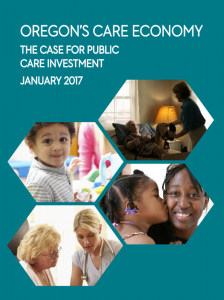
Raahi Reddy, Mary King and Laura Dresser
Oregon’s Care Economy: The Case for Public Care Investment (2017)
In this paper we make the case for a comprehensive public policy approach to addressing Oregon’s care gap by
enabling family members to care for loved ones without economic penalty and ensuring paid caregivers are able to
provide high quality care without compromising their own well-being, while all people receive care who need it. We describe Oregon’s care economy; outline the serious weaknesses of our current care infrastructure for children, seniors
and people living with disabilities; provide evidence of the high economic returns to public care investments; and point out that the most successful care investment programs simultaneously address the needs of over-burdened unpaid care
providers, the high cost and uneven quality of paid care, and significantly increase the care workers’ wages.
LABOR STANDARDS and WORKPLACE PROTECTIONS
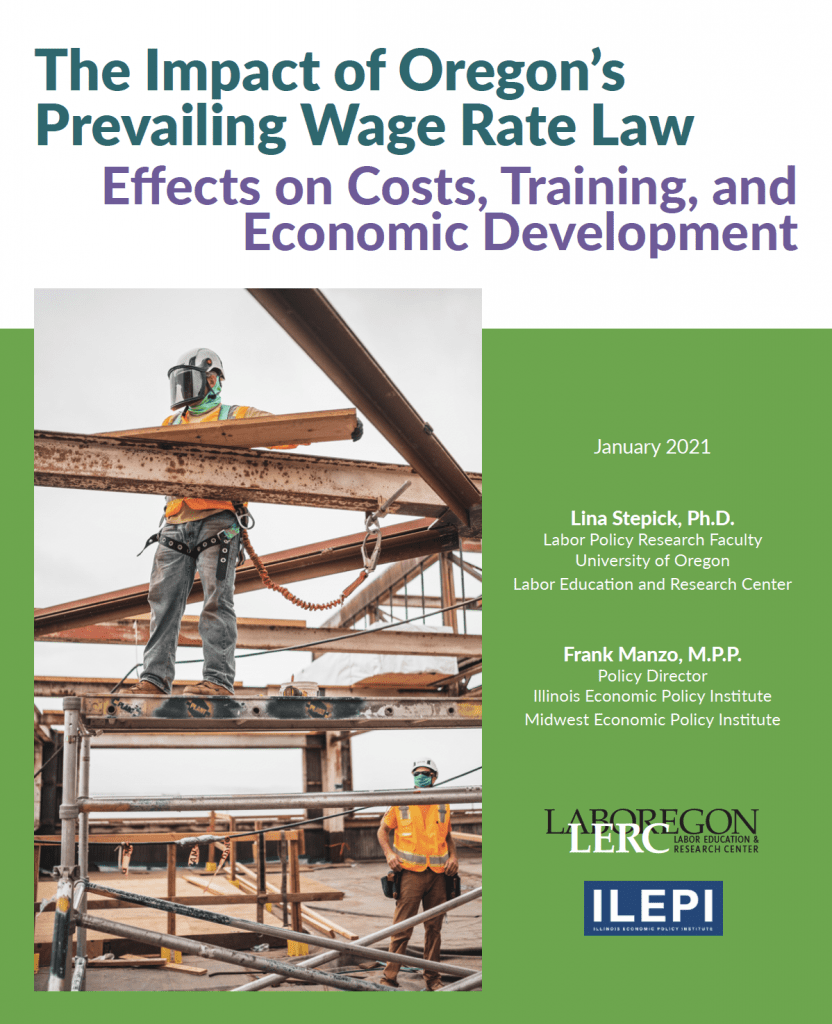
The Impact of Oregon’s Prevailing Wage Rate Law: Effects on Costs, Training, and Economic Development
The LERC and Illinois Economic Policy Institute study on the impacts of Oregon’s Prevailing Wage Rate law finds that the law does not increase project costs, does boost bid competition and the share of projects that local contractors are awarded, and increases wages and health insurance coverage.
Oregon’s Prevailing Wage Rate Law creates 5,400 jobs, improves the state economy by $752 million, and generates $35 million in state and local tax revenues every year. See the full report hereReport brief
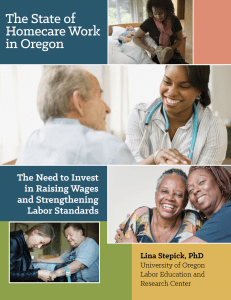 The State of Homecare Work in Oregon: The Need to Invest in Raising Wages and Strengthening Labor Standards, by Lina Stepick shows that Homecare work has one of the highest projected growth of any occupation. The homecare industry is growing rapidly while nonunion private agency homecare workers’ wages stagnate. This study details how raising wages and standards in this industry is necessary to recruit and retain the skilled and dedicated workforce Oregon needs.
The State of Homecare Work in Oregon: The Need to Invest in Raising Wages and Strengthening Labor Standards, by Lina Stepick shows that Homecare work has one of the highest projected growth of any occupation. The homecare industry is growing rapidly while nonunion private agency homecare workers’ wages stagnate. This study details how raising wages and standards in this industry is necessary to recruit and retain the skilled and dedicated workforce Oregon needs.
A second, follow-up LERC study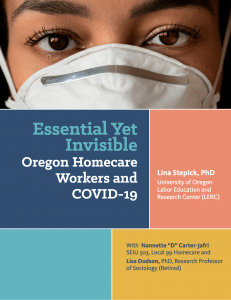 with homecare workers in Oregon examines how COVID-19 has made already hazardous and complex work even more risky and challenging to navigate, as homecare workers often must figure out on their own how to adapt care routines and take on additional health and safety precautions at work. Because homecare work is primarily conducted by women and is one of the most racially and ethnically diverse professions nationally and in the state of Oregon, these new challenges disproportionately affect women and women of color specifically.
with homecare workers in Oregon examines how COVID-19 has made already hazardous and complex work even more risky and challenging to navigate, as homecare workers often must figure out on their own how to adapt care routines and take on additional health and safety precautions at work. Because homecare work is primarily conducted by women and is one of the most racially and ethnically diverse professions nationally and in the state of Oregon, these new challenges disproportionately affect women and women of color specifically.
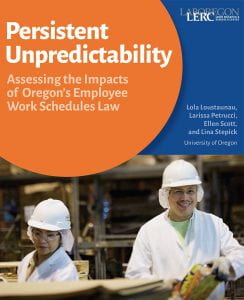 A LERC and UO Sociology study on the impacts of the first statewide Fair Workweek law reveals “Persistent Unpredictability” in Oregon retail, food services, and hospitality workers’ schedules, as employers find ways to continue changing workers’ schedules at the last minute and avoid predictability pay obligations.While the law is a first step in addressing unstable scheduling practices and increases advance notice and ensures workers have the right to rest between shifts, certain provisions, such as the voluntary standby list, leave room for improvement. This study also reveals the need for adequate funding for BOLI as more robust resources for education and enforcement are necessary.
A LERC and UO Sociology study on the impacts of the first statewide Fair Workweek law reveals “Persistent Unpredictability” in Oregon retail, food services, and hospitality workers’ schedules, as employers find ways to continue changing workers’ schedules at the last minute and avoid predictability pay obligations.While the law is a first step in addressing unstable scheduling practices and increases advance notice and ensures workers have the right to rest between shifts, certain provisions, such as the voluntary standby list, leave room for improvement. This study also reveals the need for adequate funding for BOLI as more robust resources for education and enforcement are necessary.
For more see full report here: Persistent Unpredictability: Assessing the Impacts of Oregon’s Employee Work Schedules Law
In a follow up study to the “Predictable Unpredictability: Assessing the Impacts of Oregon’s Employee Work Schedules Law” LERC and UO Sociology researchers conducted 52 in-depth interviews with Oregon retail, food services, and hospitality workers about what it means to be an essential worker in the service sector under COVID-19. This study, #Forever Essential, reveals that workers have no choice but to be essential and continue working despite facing new physical and emotional hazards in their workplaces. See the brief here.
UNLAWFUL: U.S. employers are charged with violating federal law in 41.5% of all union election campaigns LERC Professor Gordon Lafer and Graduate Student Lola Loustaunau along with other collaborators, have co-written a new study published by the Economic Policy Institute.
The data show that U.S. employers are willing to use a wide range of legal and illegal tactics to frustrate the rights of workers to form unions and collectively bargain. The combination of illegal conduct and legal coercion has ensured that union elections are characterized by employer intimidation and in no way reflect the democratic process guaranteed by the National Labor Relations Act.
September 2017, Gordon Lafer co-authored an academic paper together with former US Department of Labor Chief Economist Heidi Shierholz. The paper, titled What union coverage numbers might look like without NLRA preemption, is available for download here. The paper addresses recent suggestions that effective union representation might be improved by waiving federal preemption under the National Labor Relations Act, and allowing states to set private sector labor law, as they do for the public sector. The paper was presented at a conference of the Harvard University Labor & Worklife Program, and is slated for publication in a special issue of the online Harvard Law Journal.
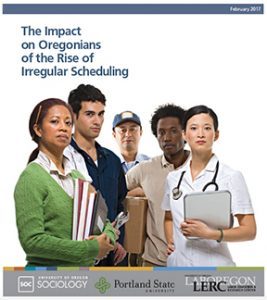
Mary C. King
 The Care Revolution: The Transformation of Home Health Care in Oregon
The Care Revolution: The Transformation of Home Health Care in Oregon
A short film (28 minutes) collaboration by Sonia De La Cruz, Division of Culture, Arts and Communication, University of Washington-Tacoma, and Bob Bussel, Labor Education and Research Center “The Care Revolution” tells the inspiring story of the first wave of organizing by Oregon’s home care workers. Grounded in extensive interviews with workers, the film explains how union representation has transformed the lives of caregivers and improved the quality of care for the people they serve. See the short film on YouTube.
The LERC Monograph Series on public sector labor relations includes definitive research and commentary on the workings of Oregon’s Public Employee Collective Bargaining Act (PECBA) by labor and management advocates as well as neutrals.
OCCUPATIONAL SAFETY and HEALTH
Safety Voice for Ergonomics (SAVE): Evaluation of a masonry apprenticeship training program, Jennifer A. Hess,Laurel Kincl, Douglas L. Weeks, Amelia Vaughan, and Dan Anton
Masons have high rates of strains and sprains, more than other construction trades. Viable solutions to these musculoskeletal injury hazards have been identified by industry stakeholders, yet in the past masons have received minimal ergonomics training to prevent such injuries. Apprentices and other younger workers have even higher rates of injury so it essential to provide them with ergonomics training and strategies to identify and speak up about safety issues on job sites. To fill this gap, our team developed the Safety Voice for Ergonomics (SAVE) training, a 7-unit, interactive video training with discussions, quizzes and activities that specifically address masonry ergonomic hazards and solutions. This training is available to download for free from the Center for Construction Research and Education.

